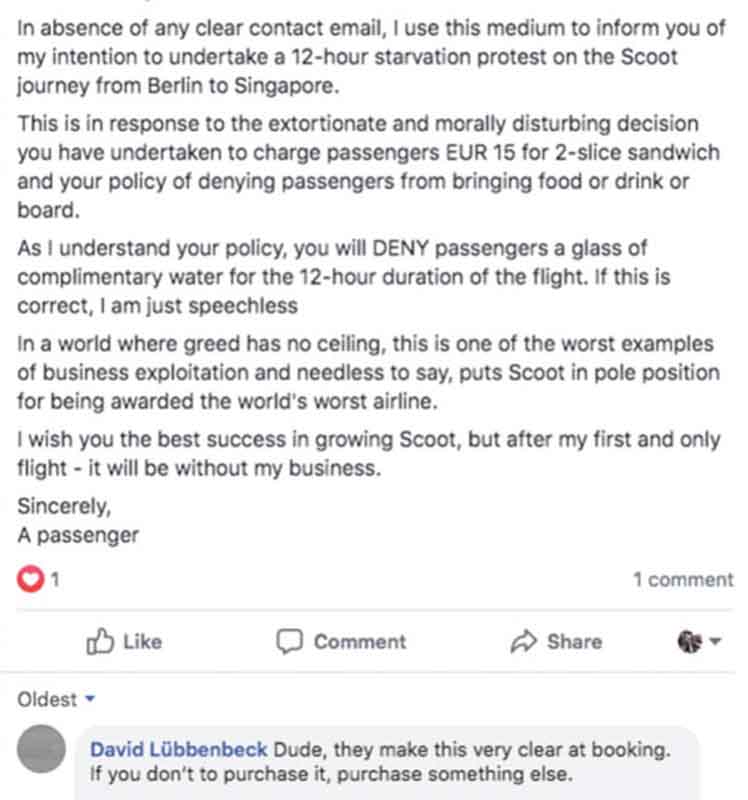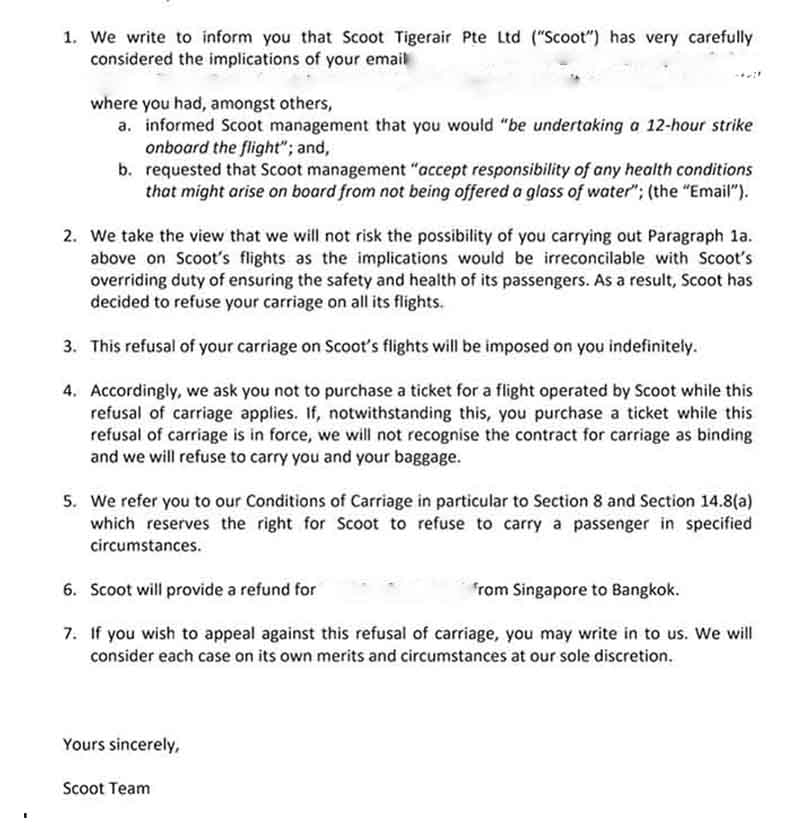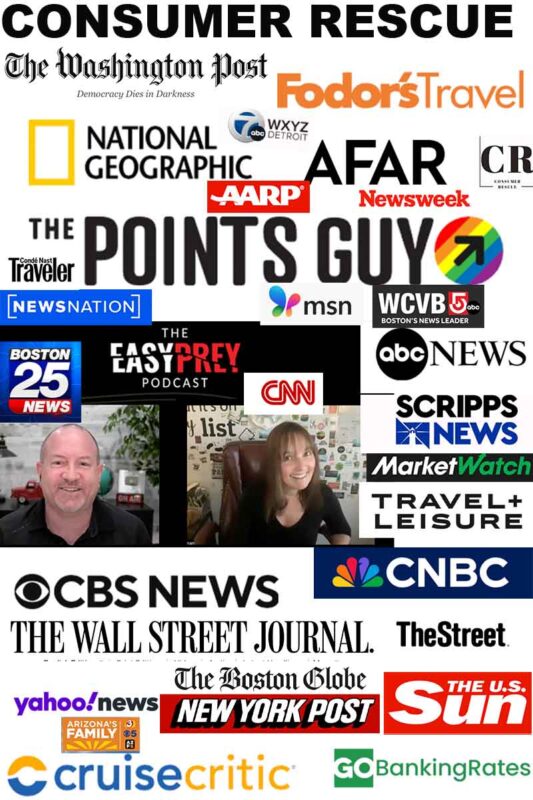We’ve all heard the stories of air passengers getting banned from flying for aggressive and outlandish behavior. But Marko K. found a more harmless and unique way to get banished permanently by an airline. After threatening a mid-air starvation strike to protest the cost of airline food, he landed directly on Scoot’s no-fly list.
Marko hopes we can defend his cause. But is that something we can do?
Marko’s tale serves as a reminder to travelers. Passengers who make any threats of problematic behavior – even benign ones – can end up banned from flying. No airline crew wants to be faced with an inflight situation that could force an emergency landing. So it’s vital that passengers resolve all of their complaints and concerns on the ground, not 30,000 feet in the air.
*Note: We are obscuring Marko’s last name because it’s not our intention to embarrass anyone who asks for our help. The Consumer Rescue team aims to successfully mediate as many cases as possible and offer teaching moments when we can’t. No one should be afraid to ask for our assistance for fear of being publicly shamed.
Making threats of an inflight hunger strike
Marko’s problems began after he booked a long-haul flight on Scoot, a budget Asian carrier.
“I’m the founder of a nonprofit. I spend a lot of time traveling around the world to raise funds for our work,” Marko explained. “Therefore, I usually use low-cost airlines. In November, I booked a flight from Germany to Singapore on Scoot. I was aware that the cost of the ticket included no food or drink.”
Marko didn’t have a problem with the airline offering no complimentary refreshments — until two days before the flight.
As Marko was checking in for his trip, he noticed a variety of ‘add-ons’ available for purchase. He says that one of those offerings was a sandwich that cost 15 euros (about $16).
“I believe that the cost of that sandwich is about five times higher than what similar airlines offer,” Marko complained “Feeling aggrieved that Scoot would put passengers in this position, I wrote a letter to the CEO. I told him that I would be on a hunger strike for the 12-hour flight in protest of the outrageous prices.”
That letter set the wheels in motion for Marko’s upcoming problem.
Now you’re banned from flying this airline — permanently
The airline did not respond to Marko’s threat — until he arrived at the airport on the day of the flight. As he prepared to begin his hunger strike, several agents of Scoot approached him. They told him that he was banned from flying that day unless he signed a waiver agreeing to abandon his plan.
Marko says he signed five copies of the document and agreed not to conduct his in-flight protest after all. The airline representatives then allowed him to board the plane and he flew to Singapore without any further problems.
“I sat quietly the entire flight but I only drank water,” Marko recalled.
It wasn’t until many months later that Marko would find out the long-term repercussions of his threat. He was, in fact, banned from flying with Scoot permanently — but no one told him – yet.
Six months later, Marko needed to fly from Singapore to Bangkok and despite his threats to the CEO that he would never use the airline again, he inexplicably bought another ticket on Scoot. He used a third-party booking agent for this purchase.
Several weeks later, however, he was once again confronted by airline representatives when he arrived at the check-in counter. And just like another recent traveler discovered (See: This influencer asked for an upgrade in the worst way), Marko wasn’t going anywhere. The airline had decided to deny him boarding — permanently.
“These agents advised me that I was banned from flying with the airline — permanently,” Marko recalled. “They would not issue me a boarding pass.”
No way off the airline’s no-fly list
Marko spent the next hour trying to negotiate his way off the no-fly and onto his scheduled flight.
“They just said that both my passports — I have dual nationality — were blacklisted,” Marko explained. “So I was banned, and I wouldn’t be flying on the ticket I purchased.”
Finally accepting defeat for that day, Marko purchased another ticket on Singapore Airlines, the parent company of Scoot. He then flew to Bangkok.
Several days later, Marko says he was still reeling from the turn of events. Scoot had not sent any clarification about his banishment, and he wanted an explanation. He also wanted a refund for the flight that the airline prevented him from taking.
That’s when Marko’s sent his request for help to our advocacy team.
The airline forced me to buy a ticket at the airport and use money dedicated to helping our nonprofit. It supports vulnerable children in Asia. I would like you to help me recover the losses I suffered due to this airline’s actions and its failure to provide a basic duty of care. Also, for not informing me that I was banned from flying until I was already at the airport.
Is it really permissible for an airline to blacklist a passenger, but still issue a ticket to that traveler, and take payment?
Marko
Bad idea: Sending the airline’s CEO threats
When Marko’s emotional request for help landed on my desk, I was very puzzled. After all, why would a passenger telegraph his intended problematic behavior to the CEO of the airline? It would seem that type of action could easily end in banishment from future flights — as it did for Marko. So I asked him what he had in mind with his threat and what he hoped to accomplish.
“It’s part of my being,” Marko told me. “I must speak up against exploitation and injustices — even if it seems trivial to others.”
Marko went on to explain that Scoot does not allow passengers to bring their own food or beverages aboard their flights.
“And so passengers are forced to buy the food if they want to eat,” Marko said. “I know people who survive on less than 4 euros a day, so I was protesting the outrageous cost of this food.”
But I became even more puzzled by Marko’s complaint about the price of that sandwich when I looked at Scoot’s menu. With a wide variety of prices and choices, Scoot’s inflight menu seemed to be able to suit any passenger’s budget.
In fact, the prices seem right in line with other airlines. I could not find any sandwich that was 15 euros. The sandwiches are priced in Singapore dollars and start at SG$9, which translates to around 6 euros, or $6.50. But for the more budget-conscious traveler, there are noodles for less than $2 and lots of other snacks.
Is there social media support for this airline complaint?
I let Marko know that I thought he would find it hard to garner support for his outrage over Scoot’s prices. In fact, the letter to the CEO of Scoot that he posted on social media immediately received negative reactions from fellow passengers. Others pointed out the same thing I saw on the menu.
“Dude, they make this very clear at booking,” one commenter wrote. “If you don’t [want] to purchase it, buy something else.”

After we discussed what I thought to be the misguided nature of his threats of a hunger strike, Marko agreed that he should not protest his blacklist status on Scoot.
“My grievance is not that Scoot blacklisted me from flying — it is the fact that they did not inform me of this until one hour before my flight was departing,” Marko explained. “This caused financial and emotional distress. Can an airline do this — and can you help me?”
Now that was a valid question. So it was time for me to do some investigating.
What actions can get you banned from an airline?
It turns out that there are plenty of actions that can get you banned from flying. And no airline is required to transport any traveler who it determines is problematic.
If you want to find out what can secure your place on an airline’s blacklist, you can visit its contract of carriage.
- Delta Air Lines: Delta Air Lines lists eight reasons that you could find yourself on the blacklist. Not surprisingly, causing onboard disruptions, not following crew member instructions, and being under the influence of drugs or alcohol top the list.
- American Airlines: American Airlines describes 11 passenger responsibilities that if ignored, can get a traveler banned from flying — “either temporarily or permanently.” These include not obeying the law, being uncooperative with the airline employees or causing a situation that could pose a risk to others.
- United Airlines: Rule 21 of United Airlines contract of carriage lists a plethora of interesting situations that can get a passenger banned from the airline. Beyond the standard reasons, United points out that the bad behavior of a passenger’s service animal can also land the duo on the blacklist.
Scoot lists a whopping 26 things that can get a passenger banned from flying the airline.
Although Marko had signed the document that stated he would not conduct a hunger strike on his 12-hour flight, his own narrative indicates that he only drank water. So it would seem that he did, in fact, violate the terms of the agreement he signed in order to board that flight.
I pointed out to Marko that both of the following conditions for banishment could apply to his situation.
- If you have made threats
- If you have committed misconduct on a previous flight and we are not satisfied that misconduct will not recur
What about that letter to the airline’s CEO?
Well, when I read it, I understood why the airline would not want Marko as a customer. Not only did he threaten a 12-hour starvation project, but he also accused the airline of extortion and made unsubstantiated claims that the airline would deny even water to a passenger.
Marko went on to send emails to the CEO of Singapore Airlines, the parent company of Scoot, making similar complaints. And he sent another email to the CEO of Scoot, warning him that the airline would be responsible for his health during his hunger strike.
Why didn’t anyone tell him he was banned from flying this airline?
I thought the airline should clarify why Marko was banned from flying and if it was a permanent ban. Also of concern: the fact that Scoot allowed Marko to buy a ticket for a flight it would not allow him to take. In fact, he had never received any previous information about his blacklist status before the day he was denied boarding to Bangkok. And so, I contacted Scoot to get some clarity.
Very quickly, I received a response from Scoot, and Marko received his official banishment paper from the airline. It would seem there had been a mistake in that Marko was not previously notified of his ineligibility to fly on the airline. But now Scoot made it quite clear — he was banned from flying the airline – permanently. However, Scoot agreed to refund the flight on which it denied him boarding.

Passengers are welcome to bring their own water
Scoot executives also addressed Marko’s mistaken belief that passengers can’t bring their own water on board. And more ominous, his continued assertion that passengers who could not afford to buy water would go thirsty.
Hi Michelle,
Here is our response to your question:
Customers can bring their own bottled water and consume the water on our flights. It is also a misconception that we will not provide water when it is needed. On many occasions, our cabin crew have provided customers with water, such as when they are feeling unwell, and during prolonged flight delays.
The Scoot Resolution team to Michelle
I also contacted Singapore Airlines to make sure Marko’s blacklist did not extend to Scoot’s parent company. He was relieved to find out that it did not.
Finally, there was a little more good news for Marko. Because he was not informed of his banning before he arrived at the airport, Scoot has agreed to consider his additional costs incurred because of that mistake.
The bottom line for this passenger
Our advocacy team’s approach to problem-solving could have helped Marko. He skipped all the proven problem-solving steps that we recommend. Instead, he jumped straight to making threats that didn’t advance his cause and just created trouble for him. And I still am unclear with all the other items to choose from on the menu why that one (nonexistent?) 15-euro sandwich ignited such anger.
Thanks for your honest feedback, Michelle.
It’s humbling to read how my words/actions come across. I appreciate your advice and will take into account next time. While I agree that being polite and respectful should be the first step, I have seen too often these approaches ignored.
I live in the Philippines and consumer protection is non-existent and exploitation rampant. As such, I’m always of the mindset that companies are cheating consumers. Even before this, I felt this way.
Marko
And so, in the end, we may have to disagree on the shocking nature of a 15-euro sandwich, but we are on the very same page about protecting consumers wherever we can.
How to avoid getting banned from flying — forever
- Make any grievances known in a polite and clear way: Here’s where our article about solving your own consumer problem can help. Keep your gripe short and cordial, and end with a hoped-for resolution. Unfortunately, Marko’s grievance included no suggested solution to his complaint.
- Don’t make threats — even veiled ones — to the airline: No one wants their flight disrupted by another passenger with ulterior motives. If an airline determines you might cause trouble, it’s under no obligation to keep you as a customer.
- Read the contract of carriage: If you want to find out all the ways a passenger can get banned from flying, read the contract of carriage. This document will tell you exactly how you can avoid ending up on the blacklist. (Michelle Couch-Friedman, Consumer Rescue)
*Before you go: Bad behavior can get you banished from other companies as well. Did you know you could also find yourself banned from Facebook or even banned from cruising?


